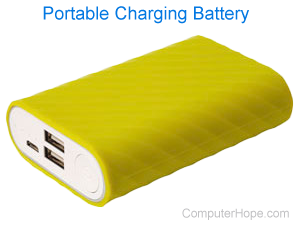Portability
Updated: 08/02/2020 by Computer Hope
Portability may refer to any of the following:

1. An object that can be easily moved, such as a portable computer. For example, a laptop is a good example of a portable computer.
2. With computer hardware, portability describes an external device that can be moved from one place to another without disrupting its operation. Examples of external, portable computer hardware include an external hard drive or external DVD (digital versatile disc) drive.
3. With computer software, portability refers to how easily software can be moved between computer operating systems.
